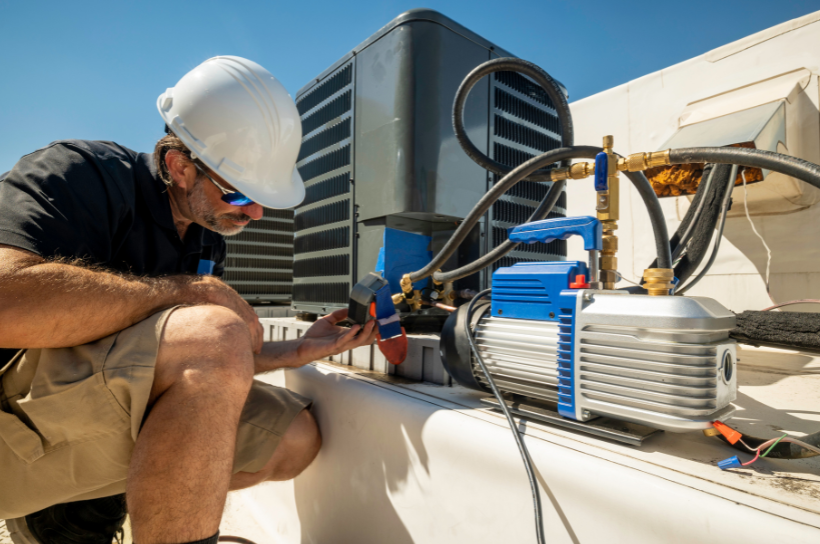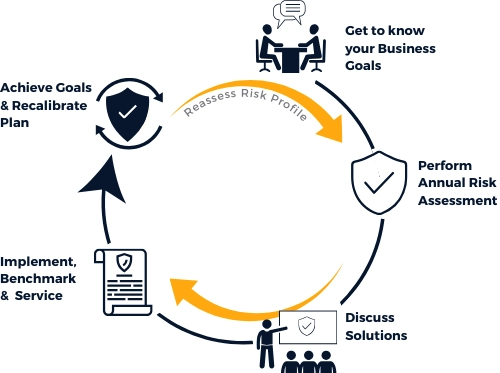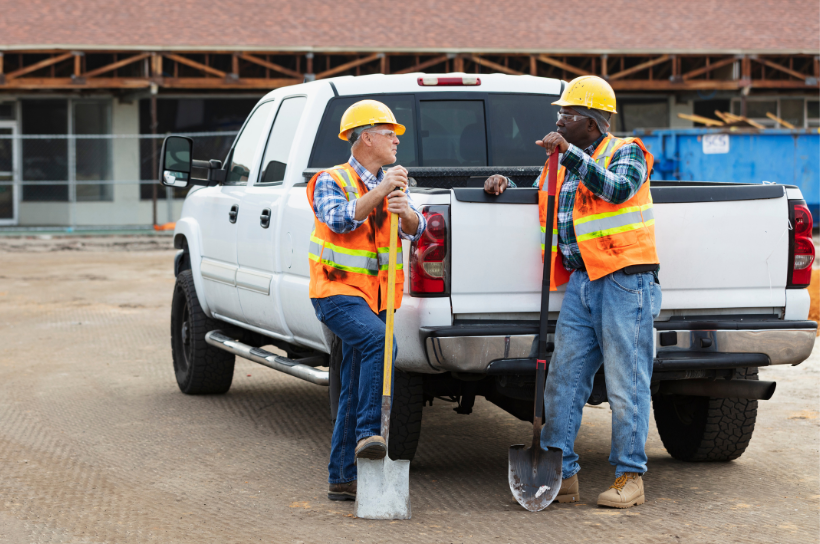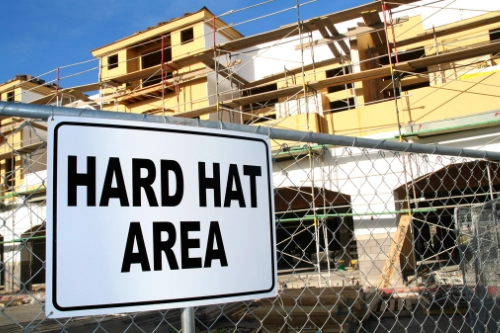888.711.RISK
Insurance built for
HVAC Contractors
Strategically control unfortunate events with a business partner that understands your unique risk profile.

Take control of common risks for HVAC Contractors
An HVAC contractor’s job isn’t easy. In a crowded marketplace, it takes consistent effort to stand out to both customers and qualified workers.
You’ve likely dealt with most of these challenges – and then some.
- Attracting clients in your competitive industry
- Recruiting and retaining skilled workers
- Seasonal fluctuations in demand
- Staying up-to-date on new technologies
All these challenges have one thing in common: If not handled properly, they could expose your business to risk.
How would your day look different if you had an industry expert on speed dial to talk you through these issues as they arose?
Managing risks for HVAC Contractors goes beyond insurance
Filing an insurance claim is reactive. It can minimize your financial loss from an incident but doesn’t improve your long-term efficiency or profitability. If your current insurance provider is simply fielding claims, you’re missing the rest of the puzzle.
What will help you make business decisions that build a bright future? Be proactive by addressing the following top challenges for hvac contractors.
A job site accident can lead to employee injuries, property damage, reputational harm, and reduced productivity.
Our top loss prevention strategies for HVAC contractors:
- Invest in effective loss control techniques like safety training
- Develop a safety program with documented policies and procedures
- Make sure you have workers’ comp coverage that covers all of your exposures
- Maintain OSHA compliance
Navigate these areas and more with Leif’s in-house safety and compliance expertise.
Today we have technology proven to reduce risk and ultimately prevent claims. Dashcams and Fleet management tools capture real-time data and diagnostics like usage, location, and maintenance. This data helps to:
- Resolve claims and disputes with indisputable video footage of incidents
- Demonstrate your commitment to driver safety to insurance carriers and identify opportunities for driver training
- Prevent accidents by addressing risky driver behaviors
An incident can damage expensive business property – whether it’s yours or someone else’s.
To protect your property and your business:
- Ensure you’re covered with equipment insurance, general liability, and commercial property insurance
- Monitor equipment with fleet management technology to prevent theft and maintenance issues
- Train employees on equipment Standard Operating Procedures
Partner with Leif to get your job sites set up with Smart Equipment today.
Noncompliance with regulations, building codes, and licensing requirements can lead to penalties, fines, or project delays.
To prevent compliance issues:
- Stay up-to-date with all regulations and codes
- Keep detailed records of permits, licenses, certifications, and inspections for each project
- Work with a risk partner specializing in your industry
Leif’s experts are dedicated to managing risk in the construction industry.
Fluctuating demand and seasonality can make it difficult to predict your cash flow and insurance costs.
Tips to avoid surprises and plan for growth:
- Choose an insurance provider with data-driven pricing
- Work with an expert to forecast your E-Mod
- Keep organized records to avoid overpaying during your work comp audit
- Identify opportunities to increase your surety bond capacity
- Consider pay-as-you-go billing plans for your workers’ compensation policy
Manage cash flow with Pay as you go work comp
Pay-as-you-go workers’ compensation insurance can be a valuable tool for contractors looking to better manage their cash flow. Contractors pay work comp premium on actual payroll instead of estimated payroll.
This means that contractors have more control over their insurance costs and can better predict their cash flow. In addition, pay-as-you-go policies can be more affordable for contractors who have seasonal or fluctuating workloads which can also help minimize year-end audit balances.
Contractors can run into legal disputes with clients, subcontractors, or suppliers. Insufficient contracts can also expose you to third-party risk.
To identify and fix these exposures:
- Have an expert conduct a detailed contract alignment review
- Do a full exposure analysis every year to uncover new or unknown exposures
Leif’s team will make sure your contracts align with your risks and provide a detailed analysis of exposures.
You must manage claims effectively to minimize their impact on your financials. It can be tough to know who to trust while navigating the claim process.
Here’s how to manage claims with confidence:
- Work with a claims consultant to guide you and advocate for you
- Project how claims will impact your premium prior to renewal
- Using captured video footage to expedite the claims process
With Leif, our in-house claims experts are there for you until the claim is closed.
Which policies are right for you?
With our diverse network of top-rated carriers, we can write any insurance program tailored to your risks.

Workers' Comp
Coverage for your employees from the financial impact of workplace injuries

Builder's Risk
Protection for buildings and structures during construction or renovation

Umbrella Coverage
Protection from losses that exceed the limits of your other policies
More than an insurance agent:
Our Consultative Approach
As your construction operation grows, your risks compound. Leif’s in-house experts help you create risk and bond strategies tailored to your business.
At Leif, we use a consultative approach to provide ongoing guidance. Our proven five-step process ensures your risk management plan aligns with your goals.

HVAC Contractor FAQs
What kinds of insurance do hvac contractors need?
Many factors influence our insurance strategy. At the beginning of your partnership with Leif, we’ll conduct a comprehensive risk assessment. Based on our findings, we might recommend:
- General liability
- Commercial property
- Workers’ compensation
- Equipment insurance
- Commercial auto
- Professional liability
- Builder’s risk
- Pollution liability
- Other policies that fit your risk exposures
Most contractors must also have surety bonds to work on government projects.
What’s the difference between general liability and professional liability insurance?
These two policies both protect your business from liability, but the types of liability they cover are different. General liability covers accidents and property damage caused by your business, while professional liability (also called errors & omissions insurance) covers claims of professional mistakes or negligence.
Put simply, general liability covers physical risks while professional liability covers service-based risks. HVAC contractors can benefit from both.
What is a Certificate of Insurance and why do I need it?
A Certificate of Insurance is a document verifying your insurance coverage. It provides proof to clients and other partners that your business has adequate insurance. Clients might ask you to provide a COI before starting work or entering into a contract.
Why do I need a formal safety program?
Every year, thousands of construction workers are injured on the job. Even if your employees know how to work safely, incentives like finishing quickly can lead them to make unsafe choices.
That’s why every business needs a safety program with documented policies and procedures, regular training, incident reporting, and an investment in safe equipment.
In addition to the invaluable outcome of saving lives, a safety program also benefits your business by:
- Increasing productivity
- Improving employee morale and reducing turnover
- Strengthening your company’s reputation
- Reducing your legal liability
- Improving your claims experience, reducing insurance costs over time
How can I control my insurance spend?
Controlling insurance spend is a top priority for contractors. The best way to control costs is to get a thorough, accurate, and real-time view of your business’s risk.
How?
By partnering with construction experts to assess your risk and collect data using fleet management technology.
This information helps you improve safety, streamline maintenance, and boost efficiency. It also qualifies you for discounts based on safe operator behavior – and it’s only available from Leif.
How can surety bonds help me grow my business?
A bond is a three-party contract between you (the principal), your client (the obligee), and the surety provider. If you fail to perform according to the contract terms, the surety will step in to fulfill your obligation.
In this event, the surety provider will expect to be made whole via the indemnity agreement, which is both a corporate and personal guarantee from you to the surety.
Surety bonds can boost your revenue and fuel your growth as a general contractor by:
- Allowing you to bid on larger and more complex projects
- Improving your reputation
- Helping you build the company’s financial strength and generational wealth
Bonds are required on all public projects and many private commercial projects. Our in-house bond underwriters can help you secure the bonds you need and increase your bonding capacity to win bigger projects.

Personalized serviceyou can count on, every time
We deliver exceptional service across all lines of insurance by promising to:
- Identify coverage gaps and quickly secure new policies
- Partner with strong carriers to offer the best program available
- Respond quickly to calls, texts, and chat during business hours
- Offer after-hours claims consultation for 24/7 emergency support
- Deliver most COIs within 2 business hours and bonds overnight
- Create a strategy to maximize your bond capacity for growth
Whether you’re a large multi-state firm, local trade contractor, or something in between – you can hold us to our promise.


